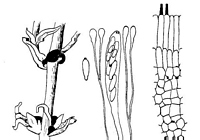|
 Cashiella montiicola Cashiella montiicola
SynonymsMollisia montiicola
Peziza montiicola
BiostatusPresent in region - Indigenous. Endemic
Images (click to enlarge)
Caption: Fig. 2. Cashiella montiicola. Habit sketch x 10, details x 660. |
Article: Dennis, R.W.G. (1961). Some inoperculate Discomycetes from New Zealand. Kew Bulletin 15(2): 293-320.
Description: Apothecia sessile, cupshaped, 0.5 mm. diam., black throughout, receptacle smooth, excipulum
composed of isodiametric, rounded to angular, thin-walled, dark brown cells, up to 9 x 6 µ,
passing into parallel hyphae at the extreme margin only. Asci clavate, 8-spored, 65-70 x 9-10
µ, the small pore blued by Melzer's reagent; ascospores biseriate above, uniseriate below,
ellipsoidal, hyaline, nonseptate. 9-11 x 3-4 µ; paraphyses very slender, often forked, tips
suddenly enlarged, pyriform, 3-5 µ wide, forming an epithecium.
Notes: I feel this species cannot be left in Mollisia because of its forked paraphyses with greatly
enlarged brown tips cohering to form an epithecium. I have not seen the type species of
Cashiella, C. atra Petrak, and refer the fungus here from his description only, though this
does not indicate the iodine reaction of the asci or even, clearly, that they are inoperculate.
Article: Saccardo, P.A. (1889). Discomyceteae et Phymatosphaeriaceae. Sylloge Fungorum 8: 3-859 Padua: (http://194.203.77.76/LibriFungorum/Search.asp?ItemType=I).
Habitat: in Montia fontana putri, Ahuriri, Eastern Coast Novae Zelandiae (COLENSO).
Notes: -
Pyrenopezizae atratae affinis; an ergo hujus generis?
Article: Berkeley, M.J. (1855). Fungi. Flora Novae-Zelandiae. Part II. Flowerless Plants. The Botany of the Antarctic Voyage II Hooker, J.D. (eds.) 378 p. 172-210, 338 London: Lovell Reeve.
Description: Minute, black, soon expanded, with a narrow margin, sometimes flexuose. Asci clavate,
large; sporidia subcymbiform; endochrome bipartite; paraphyses linear, much longer than the
asci.
Notes: Allied to P. atrata, but apparently distinct from all its forms.
|